Life Sciences News
See our Latest Journal Publications
Dr Liz Fullam discusses TB research at Buckingham Palace
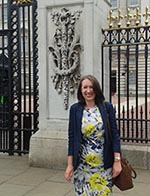 On 23rd June, Dr Liz Fullam was invited to Buckingham Palace for afternoon tea as a Sir Henry Dale fellow. The event, organised by the Royal Society, enabled newly appointed fellows to meet with his Royal Highness the Duke of York. HRH kindly hosted the event, giving him the opportunity to find out more about the research of some of our best young scientists. Liz met HRH and spoke about her work on tuberculosis (TB) and the importance of finding new drugs and diagnostics for this disease.
On 23rd June, Dr Liz Fullam was invited to Buckingham Palace for afternoon tea as a Sir Henry Dale fellow. The event, organised by the Royal Society, enabled newly appointed fellows to meet with his Royal Highness the Duke of York. HRH kindly hosted the event, giving him the opportunity to find out more about the research of some of our best young scientists. Liz met HRH and spoke about her work on tuberculosis (TB) and the importance of finding new drugs and diagnostics for this disease.
Nationwide oilseed rape survey indicates high levels of TuYV infection this season
 Results from a nationwide survey on oilseed rape indicate a high incidence of Turnip Yellows Virus (TuYV) in parts of England this year. Dr John Walsh, who led the research on behalf of seed breeder Limagrain UK, presented his findings at the Cereals 2015 event held in Lincolnshire 10 -11 June 2015.
Results from a nationwide survey on oilseed rape indicate a high incidence of Turnip Yellows Virus (TuYV) in parts of England this year. Dr John Walsh, who led the research on behalf of seed breeder Limagrain UK, presented his findings at the Cereals 2015 event held in Lincolnshire 10 -11 June 2015.
‘Levels of infection are much higher than they have been for the past few seasons, with crops in parts of Yorkshire as much as 92% infected. Generally these hotspots are where you would expect them to be due to the large areas of oilseed rape being grown locally.'
TuYV is thought to be the most damaging of all viruses transmitted in brassica crops, yet least understood. Carried by the peach-potato aphid, it results in yield losses and tipburn after storage. Dr Walsh believes that the high incidences of infection have come about as a result of the high numbers of aphids flying last year.
'Last winter was mild and there were high levels of peach-potato aphid, leading to very high levels of the virus.'
Changing perceptions of Britain from the Mesolithic to Neolithic age
 The Mesolithic-to-Neolithic transition marked a profound change in human society as a hunter-gatherer economy gave way to agriculture and the development of complex societies. In Northern Europe, this coincided with rising sea levels which cut Britain off from the continental mainland.
The Mesolithic-to-Neolithic transition marked a profound change in human society as a hunter-gatherer economy gave way to agriculture and the development of complex societies. In Northern Europe, this coincided with rising sea levels which cut Britain off from the continental mainland.
Professor Robin Allaby explains his new research which challenges the traditional evaluation of the development of early British man.
Researchers have been awarded over £1.3m to research food security
Researchers from the University of Warwick’s School of Life Sciences (SLS) have been awarded over £1.36m in grants to further their work into food security.
The BBSRC Horticulture and Potato Initiative (HAPI) grants include substantial cash and in-kind contributions from industrial partners and will be used to support work into how to improve pest and disease control and post-harvest quality.
Commenting on the grants Professor Laura Green, Head of SLS, said:
“The BBSRC HAPI grants will help ensure that the University of Warwick’s School Life Sciences continues to play a leading role in improving food production globally. The Warwick HAPI-funded projects will result in substantial impacts on the horticulture industry by translating research findings into solutions that benefit several stages in the food supply chain, including farmers, processors and retailers.”
Researchers secure £3.19m boost to tackle superbugs
Life Sciences researchers have been awarded £3.19m in funding to support a flagship project into antimicrobial resistance (AMR).
The funding will enable multi-partner collaborations in order to tackle the growing threat of superbugs as part of a co-ordinated multi-disciplinary effort to fight their prevalence.
Awarded by a cross research council ‘war cabinet’ on AMR comprising the Medical Research Council (MRC) and the Biological Sciences Research Council (BBSRC), the funding marks one of the largest UK public grant investments in AMR research.
Researchers Prof Chris Dowson, Dr David Roper, Dr Adrian Lloyd from the School of Life Sciences and Prof Matthew Turner of the Department of Physics, will investigate a vital link in the chain of antimicrobial resistance – the bacterial cell wall. The main component of the wall is called peptidoglycan, which is the key target of penicillin and other similar antibiotics.
Nick Dale, Professor of Neuroscience awarded £755,273 from BBSRC for his project 'Amino acid sensing by hypothalamic tanycytes'
 Nick Dale, Professor of Neuroscience in the School of Life Sciences, has been awarded £755,273 from BBSRC for his project on ‘Amino acid sensing by hypothalamic tanycytes’.
Nick Dale, Professor of Neuroscience in the School of Life Sciences, has been awarded £755,273 from BBSRC for his project on ‘Amino acid sensing by hypothalamic tanycytes’.
The research will focus on specialised cells known as tanycytes, which play a crucial role in detecting the levels of important metabolites such as amino acids and glucose in the brain.
This sensing mechanism helps the brain to regulate the balance between energy storage and expenditure, leading to the gain and loss of body weight, so understanding the biological factors involved in these processes could lead to major impacts on health and wellbeing.
IAS Fellowship success in SLS
 John Sidda has been awarded an Early Career Fellowship from the University of Warwick’s Institute of Advanced Study (IAS).
John Sidda has been awarded an Early Career Fellowship from the University of Warwick’s Institute of Advanced Study (IAS).
John, who recently completed a PhD under the supervision of Dr Chris Corre in the School of Life Sciences and the Department of Chemistry, will build on his previous research on the regulatory mechanisms involved in bacterial natural product biosynthesis, which led to the discovery of new natural products from Stremtomyces venezuelea.
His Fellowship project, which was co-funded by the School of Life Sciences’ Pump Priming Fund, aims to develop the methodology used for natural product discovery in other Streptomyces species.
Insecticide-based brassica seed treatment to help protect against Turnip yellows virus, estimated to save the industry £58M in 2015
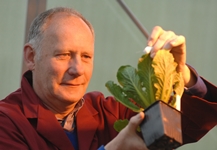 Research by Dr John Walsh from the School of Life Sciences, funded by the Horticultural Development Company, has provided the scientific evidence required to justify an Emergency Crop Protection Authorisation enabling the use of an insecticide-based seed treatment in the UK.
Research by Dr John Walsh from the School of Life Sciences, funded by the Horticultural Development Company, has provided the scientific evidence required to justify an Emergency Crop Protection Authorisation enabling the use of an insecticide-based seed treatment in the UK.
John’s research demonstrated the role played by peach-potato aphid in carrying Turnip yellows virus (TuYV), the most damaging of all viruses transmitted by aphids in brassica crops, which results in yield losses and tipburn after storage. The seed treatment technique protects plants from aphid attack for up to ten weeks after planting and effectively reduces and delays TuYV infections.
The Brassica Growers Association estimated that this has saved the industry around £58M in 2015 due to the reduced requirement for additional insecticide treatments, and prevention of yield and storage losses. Current research funded by BBSRC is based on developing an integrated strategy for control of TuYV in crops.
BBSRC award £601,861 to study Footrot in sheep

Professor Laura Green and Dr Kevin Purdy from the School of Life Sciences and Professor Matthew Keeling from the School of Life Sciences and the Mathematics Institute, at the University of Warwick have been awarded £601,861 to study the issue of Footrot in sheep.
The Biotechnology and Biological Sciences Research Council's (BBSRC) Animal Health Research Club (ARC) announced the award on Friday 27th March 2015 as part of a range of new research projects to improve the health of livestock.
Professor Laura Green, Head of the School of Life Sciences at the University of Warwick said:
“Footrot is very common in sheep in the UK, affecting more than 95% of sheep flocks. Footrot is caused by Dichelobacter nodosus, a bacterium that causes inflammation of the skin of the foot which leads to lameness. Using swab samples collected from the feet of sheep kept under different managements, the study will determine which molecular factors in Dichelobacter nodosus and which managements in sheep are most important in disease progression and how these lead to disease spread and persistence, informing on potential approaches to improve flock resilience to the disease."
Dr Celia Caulcott, BBSRC Executive Director, Innovation and Skills, said:
"By targeting these livestock diseases the Animal Health Research Club projects have the potential to protect farmed animals and food supplies and save UK farmers and the wider economy millions of pounds a year.”
“The Club shows that the public sector and private industry can work together to fund and support excellent research tackling important research challenges.”
Press release
HDC funded PhD student discusses issues facing the daffodil industry with Midlands Today
 James Syrett, an HDC funded PhD student from the Warwick Crop Centre discusses issues facing the daffodil Industry with BBC Midlands Today
James Syrett, an HDC funded PhD student from the Warwick Crop Centre discusses issues facing the daffodil Industry with BBC Midlands Today ![]() (24th March) and BBC Radio 4, Farming Today
(24th March) and BBC Radio 4, Farming Today ![]() (25th March). The price of a bunch of daffodils has remained fixed for a number of years despite significantly rising production costs.
(25th March). The price of a bunch of daffodils has remained fixed for a number of years despite significantly rising production costs.
His research project is looking at identifying technologies and growing practices to maintain the industry’s profitability.
Nick Dale, Professor of Neuroscience awarded a prestigious Royal Society Wolfson Research Merit Award
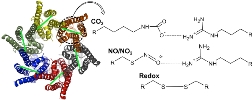 Nick Dale, Professor of Neuroscience in the School of Life Sciences, has been awarded a prestigious Royal Society Wolfson Research Merit Award, which recognises experienced researchers with a track record of outstanding achievements and the potential to make further significant contributions to their field of research.
Nick Dale, Professor of Neuroscience in the School of Life Sciences, has been awarded a prestigious Royal Society Wolfson Research Merit Award, which recognises experienced researchers with a track record of outstanding achievements and the potential to make further significant contributions to their field of research.
The funding will support Nick’s research on the role of CO2 sensing mediated by connexin-26 in health and disease. Connexin-26 is a protein that forms a channel between neighbouring cells, allowing them to communicate with one another via the movement of signalling molecules; it is found in specialised nerve cells in the brain and has been implicated in the regulation of breathing.
This pioneering study has the potential to make very significant advances in the understanding of CO2-mediated signalling in the brain by linking the structural biology of connexin-26 channels and cell signalling to neurophysiological function, offering the prospect of major impacts on human health through the advanced understanding of the regulation of cerebral blood flow and the roles of this novel CO2-signalling mechanism.
Sedimentary DNA from a submerged site reveals wheat in the British Isles 8000 years ago
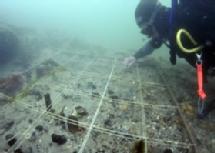 A research team led by Dr Robin Allaby of the School of Life Sciences has found evidence of wheat reaching Britain 2000 years before the arrival of farming in the UK.
A research team led by Dr Robin Allaby of the School of Life Sciences has found evidence of wheat reaching Britain 2000 years before the arrival of farming in the UK.
This has a significant impact on our understanding of Britain in pre-Neolithic times, indicating that the ancient British were not cut off from mainland Europeans on an isolated island 8,000 years ago as previously thought with the most plausible explanation for the wheat reaching the site being the existence of social and trade networks. It is thought that these networks might have been assisted by land bridges that connected the south east coast of Britain to the European mainland, facilitating exchanges between hunters in Britain and farmers in southern Europe.
Evidence for a variety of wheat known as Einkorn was found from sedimentary DNA at a submerged archaeological site off the south coast of England (picture above by Roland Brookes, The Maritime Archaeology Trust).
The research work was completed in collaboration with co-leads Professor Vincent Gaffney of the University of Bradford and Professor Mark Pallen of Warwick Medical School, the Maritime Archaeology Trust, the University of Birmingham and the University of St. Andrews.
This research has been published in the academic journal Science, February 2015
More Information
School of Life Sciences contributes expertise to Government review on antimicrobial resistance
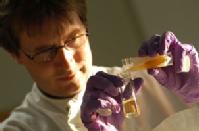 Chris Dowson, Professor of Microbiology in the School of Life Sciences, was one of a panel of experts who gave extensive input and advice during the preparation of a Government review on antimicrobial resistance.
Chris Dowson, Professor of Microbiology in the School of Life Sciences, was one of a panel of experts who gave extensive input and advice during the preparation of a Government review on antimicrobial resistance.
The review was commissioned by the Prime Minister to address the growing global problem of drug-resistant infections and was Chaired by Jim O’Neill and supported by the Wellcome Trust and the UK Government.
It is estimated that antimicrobial resistance will cost the world an additional 10 million lives a year by 2050, more than the number of people currently dying from cancer annually. The paper identifies several key areas where immediate action should be taken, including an increase in funding for early-stage research into antimicrobials and greater investment in skilled people who can help to solve the problem.
This paper is the second in a series that works towards global and sustainable solutions; a final package of actions will be recommended to the UK Prime Minister and Governments across the world by the summer of 2016.
New £12 million Synthetic Biology Centre to help drive advances in biotechnology, medicine and food security
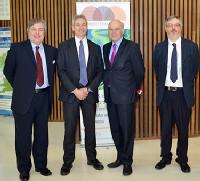 Researchers at the Warwick Integrative Synthetic Biology Centre (WISB), University of Warwick, that brings together disciplines including Life Sciences, Engineering, Chemistry, Computer Science, Education, and Law, have won a £12 Million award to create a new Centre to develop advanced technologies in synthetic biology.
Researchers at the Warwick Integrative Synthetic Biology Centre (WISB), University of Warwick, that brings together disciplines including Life Sciences, Engineering, Chemistry, Computer Science, Education, and Law, have won a £12 Million award to create a new Centre to develop advanced technologies in synthetic biology.
Vince Cable, the Secretary of State for Business, Innovation and Skills announced the new Centre as part of a £40M investment in UK synthetic biology, at the Manchester Institute for Biotechnology on Thursday 29th January.
Professor John McCarthy, Director of WISB and from the School of Life Sciences (pictured above with Vince Cable), said:
" We are delighted to receive this strategically important UK Synthetic Biology Centre Award. Synthetic biology has huge potential to generate valuable processes and products for biotechnology and medicine, as well as new understanding of the fundamental principles that underpin living systems. WISB is building a globally recognized presence as a centre of excellence in research and training in Synthetic Biology, and this grant from BBSRC and EPSRC will help us enormously in achieving our goals.”
Liz Wellington awarded £450,000 by NERC as part of strategic initiative on Environmental Microbiology and Human Health
Liz Wellington has been awarded £450,000 by NERC for ‘Using next generation sequencing to reveal human impact on aquatic reservoirs of antibiotic resistant bacteria at the catchment scale’.
The three-year project was funded through NERC’s strategic initiative on Environmental Microbiology and Human Health, which aims to provide the scientific evidence to support fast and efficient identification of pathogenic/allergenic microorganisms and biological material in environmental media which can be used in appropriate tools and models for the protection of public health.
Learn more about your vegetables
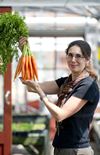 On Tuesday 6 January, Dr Charlotte Allender from Warwick Crop Centre shared her vegetable knowledge with BBC Coventry and Warwickshire's Phil Upton.
On Tuesday 6 January, Dr Charlotte Allender from Warwick Crop Centre shared her vegetable knowledge with BBC Coventry and Warwickshire's Phil Upton.
Listen on iPlayer at http://www.bbc.co.uk/programmes/p02fqlqy (from approx 2:17)
Scientists benefit from funding initiatives to protect soils and safeguard global food security
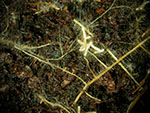 The School of Life Sciences will lead one of four projects, with combined funding of £5 million, supported by a BBSRC led initiative known as SARISA (Soils and Rhizosphere Interactions for Sustainable Agri-ecosystems). SARISA was developed with NERC under the Global Food Security (GFS) programme. Researchers will investigate the factors affecting soil microbial communities and the consequences for crop growth.
The School of Life Sciences will lead one of four projects, with combined funding of £5 million, supported by a BBSRC led initiative known as SARISA (Soils and Rhizosphere Interactions for Sustainable Agri-ecosystems). SARISA was developed with NERC under the Global Food Security (GFS) programme. Researchers will investigate the factors affecting soil microbial communities and the consequences for crop growth.
Soil is fundamental to our life support system, providing food, storing and filtering water, cycling nutrients and providing a habitat for many species. It is at the heart of our interaction with the environment and central to the responsible management of our planet. The world will need to produce 50% more food by 2030 to feed a growing world population and soil science is crucial to meeting this challenge.
Dr Gary Bending’s team will use advanced genetic sequencing methods to derive new understanding of the factors which shape the composition of the rhizosphere microbial community (i.e. its ‘microbiome’), and its consequences for crop growth. Using field crops of oilseed rape as a model system the researchers will determine the roles of soil biodiversity, local climate, soil properties, rotation and geographical distance in shaping the rhizosphere microbiome. Oilseed rape suffers 6-25 % annual losses, termed yield decline, because of the development of a detrimental rhizosphere microbiome, for which there is no treatment. The project will identify shifts in microbial composition and both microbial and plant gene expression associated with a change from a healthy to a diseased rhizosphere. They will use this data to investigate the potential to manipulate recruitment of detrimental and beneficial soil biota into the rhizosphere microbiome in order to promote crop growth and yield. Dr Graham Teakle is a Co-Investigator on the project.
Prof Elizabeth Wellington is the Warwick principal investigator in a second SARISA funded project led by Dr John Hammond at the University of Reading. This study will use a variety of approaches to better understand the role plants and microbes living in the rhizosphere play in making phosphorus available for plant growth and how these roles change during plant development under field and laboratory conditions. Other Life Sciences contributors to the project are Dr Gary Bending, Prof Dave Scanlan and Dr Alex Jones.
Minister for Universities, Science and Cities Greg Clark said
'Forging these strong partnerships between research councils and the three innovative new initiatives announced today are vital in addressing major challenges facing our society like feeding a growing population. By working together, the research councils can bring a range of perspectives to bear on these issues, ensuring that that excellent UK research is translated into tangible economic and societal benefits.'
Professor Melanie Welham, BBSRC Executive Director of Science, said:
'Soil research is an area of strategic importance for BBSRC, NERC and all the Global Food Security programme partners, particularly in relation to the 'sustainable enhancement' of agriculture. These initiatives are great examples of UK public funders working in partnership through GFS to support excellent interdisciplinary research in this area.'
'Good management of land and soils is vital to maintain soil health, nutrient cycling and biodiversity - essential to help provide enough food for a growing global population while protecting ecosystems in the wider environment and the other benefits they provide.'
University of Warwick welcomes £13m bioresearch funding
The University of Warwick has welcomed £13m of government funding to support bioresearch projects. It will fund about 260 researchers to look at global problems connected with agriculture and horticulture.
Christmas lecture: 'Talk Amongst Your Cells' - book now
 Warwick is hosting a series of six engaging and accessible lectures, open to all, over the festive period from 3-10 December 2014. Join our academics for fantastic new ideas, explosions and experiments.
Warwick is hosting a series of six engaging and accessible lectures, open to all, over the festive period from 3-10 December 2014. Join our academics for fantastic new ideas, explosions and experiments.
Dr Miriam Gifford, representing the School of Life Sciences, will present a lecture entitled 'Talk Amongst Your Cells' on Monday 8 December. Animals and plants are made up of many different cells that have to work together to enable living things to grow… So cells have to talk to each other, even the cells in slime mould! Come with us to play ping pong and Chinese whispers to give you a cell’s eye view of trying to make yourselves heard! Book your tickets
Focus on naturally occurring protein to tackle dementia
Researchers led by Dr Sonia Correa have provided the first evidence that the lack of a naturally occurring protein is linked to early signs of dementia.
Published in Nature Communications, the research found that the absence of the protein MK2/3 promotes structural and physiological changes to cells in the nervous system. These changes were shown to have a significant correlation with early signs of dementia, including restricted learning and memory formation capabilities.
